
Intro
When considering a new running shoe, there are so many similar-looking shoes on the market being made by so many different companies, it is virtually impossible to (1) know where to begin; (2) quickly figure out which one or two products from a given brand might work well for you; and (3) determine what products from other brands might be the most similar and also worth considering.
So in our new “Blister Brand Guide” series, we provide an overview of the entire product lineup of a brand; highlight how each product stands out from the rest of that brand’s lineup; and help you figure out quickly and easily which shoe might work best for you.
In our individual product reviews, we go very deep into the details of particular products. With these Brand Guides, the goal is not Depth, but Breadth. Our Brand Guides and full reviews are designed to complement each other — provide a broad overview of entire company lineups, and then also very detailed reviews of individual products.
Altra: Brand Background
All of Altra’s shoes are based on two key design principles that set them apart from a lot of other shoe company lineups. Their shoes all have a zero-drop heel-to-toe platform, and a wide, “foot-shaped” toe box. Many runners love this combo, but for people coming from shoes with higher heel-to-toe drops or narrower toe boxes, it may take some getting used to.
Since debuting their first shoe in 2011, Altra has gained popularity with both trail and road runners of all levels. The brand now offers shoes with a wide variety of cushioning, support, and traction.
As a general rule, Altra shoes have a wider and higher-volume fit than shoes from other brands. While this can cause problems for people with narrower feet, many runners love the comfort that Altra’s platform provides, particularly when it comes to letting your toes splay out.
All of their women’s shoes also feature the brand’s “Fit4Her” design, which essentially means that they modify the fit of the shoe to accommodate the slightly different shape of women’s feet.
Altra started out as a trail-running brand, but has expanded into the road-running world in the last few years.
In this Guide, we’ll present Altra’s road shoes and trail shoes separately, and will order these lineups from the most cushioned to least cushioned.
ROAD SHOES
(Most Cushioned to Least Cushioned)
Most Cushion
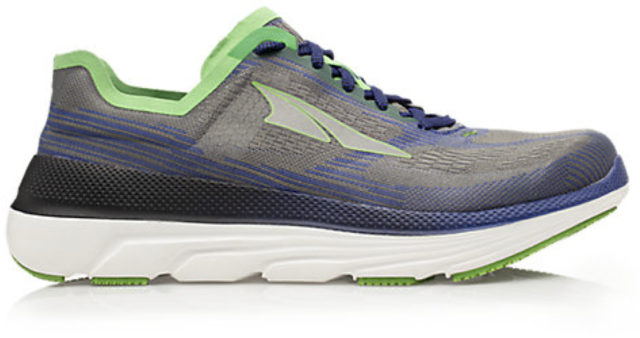
This shoe is intended to be crazy cushioned and crazy light. Altra touts it as a race-ready maximal shoe, ideal for pounding out fast miles on the roads. As a race-oriented shoe, it doesn’t have any extra midsole posting or support (e.g., like that seen on the Paradigm 4.5). The Duo 1.5 features new outsole rubber to improve on the durability of the Duo 1.0. While it has a very thick midsole, we’d recommend reading our review of the Duo 1.0 as the firm nature of its midsole makes it feel very different than many other similarly cushioned shoes.
Stack Height
- Heel: 31 mm
- Toe: 31 mm
Drop: 0 mm
Stated Weight
- Men's: 229 g
- Women's: 192 g
MSRP: $130.00
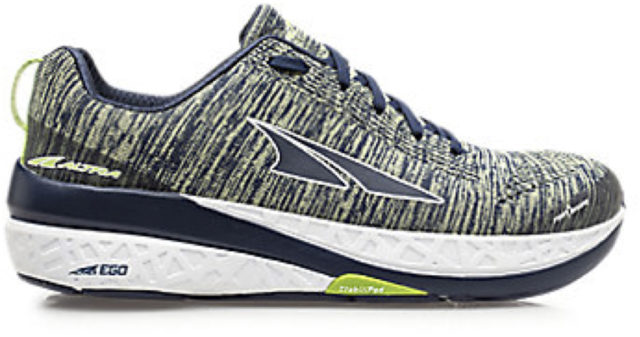
This is Altra’s most cushioned “stability” shoe. It uses the brand’s “dynamic guidance” system, which is designed to provide support when you start to fatigue, but not when you’re running normally. It was originally designed for the Badwater 135 Ultramarathon, so it seems well suited to long runs on the road, particularly if you notice that your technique can get sloppy / tiresome during long runs.
Stack Height
- Heel: 30 mm
- Toe: 30 mm
Drop: 0 mm
Stated Weight
- Men's: 318 g
- Women's: 216 g
MSRP: $150.00
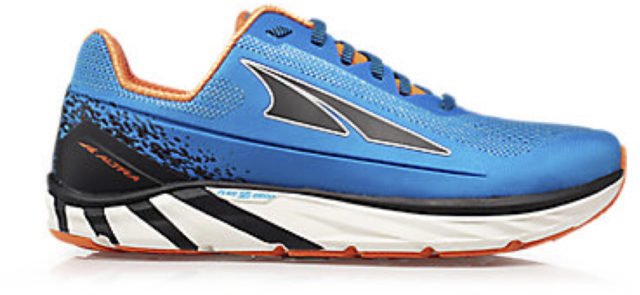
The “Plush” version of the Torin adds a little extra cushioning to the popular Torin 4, making for an even more forgiving ride. The midsole is designed to be soft and flexible, providing comfort, but at the cost of some support and efficiency. This shoe is best suited for someone who wants an everyday, max-cushioned road trainer.
Stack Height
- Heel: 28 mm
- Toe: 28 mm
Drop: 0 mm
Stated Weight
- Men's: 286 g
- Women's: 241 g
MSRP: $140.00
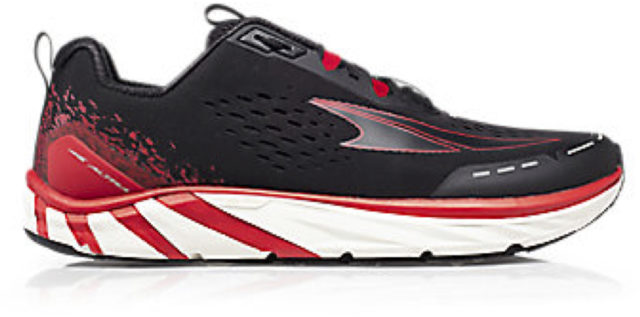
Stack Height
- Heel: 26 mm
- Toe: 26 mm
Drop: 0 mm
Stated Weight
- Men's: 258 g
- Women's: 215 g
MSRP: $120.00
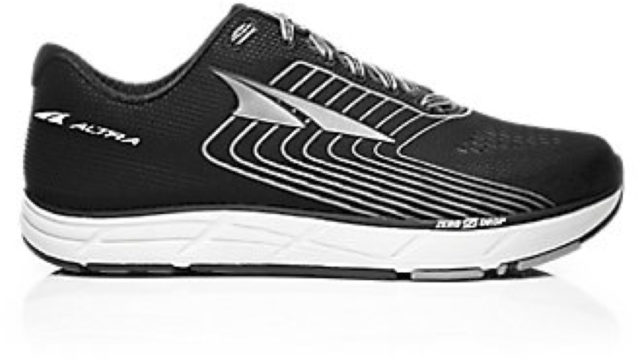
Stack Height
- Heel: 25 mm
- Toe: 25 mm
Drop: 0 mm
Stated Weight
- Men's: 278 g
- Women's: 204 g
MSRP: $110.00
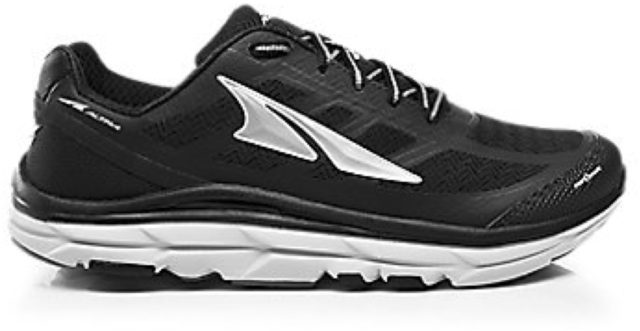
Stack Height
- Heel: 25 mm
- Toe: 25 mm
Drop: 0 mm
Stated Weight
- Men's: 283 g
- Women's: 224 g
MSRP: $120.00
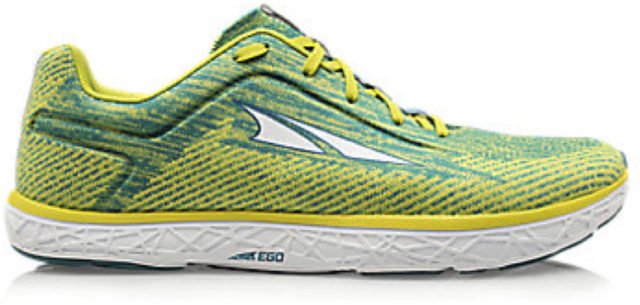
The Escalante 2 features improved flexibility and breathability compared to the first version, but maintains the efficiency-oriented design of the Escalante 1.5. The Escalante is designed for people who prefer a lower-to-the-ground shoe with a soft, flexible upper, without sacrificing much cushioning and comfort. But those who like a bit less “squish” / a little bit firmer ride should consider the Escalante Racer (see below).
Stack Height
- Heel: 24 mm
- Toe: 24 mm
Drop: 0 mm
Stated Weight
- Men's: 249 g
- Women's: 209 g
MSRP: $130.00
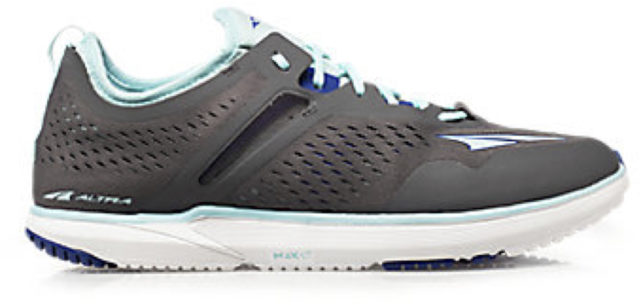
Stack Height
- Heel: 23 mm
- Toe: 23 mm
Drop: 0 mm
Stated Weight
- Men's: 167 g
- Women's: 139 g
MSRP: $110.00
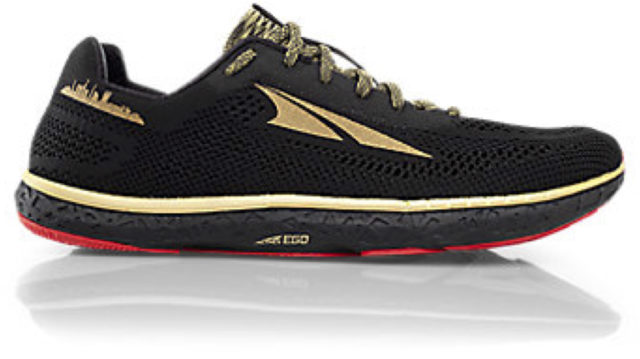
Stack Height
- Heel: 22 mm
- Toe: 22 mm
Drop: 0 mm
Stated Weight
- Men's: 193 g
- Women's: 162 g
MSRP: $140.00
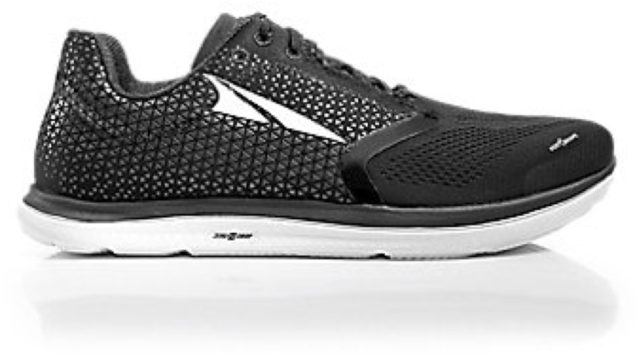
If you like the design of Altra’s other road shoes but don’t love the fairly high prices, check out the Solstice. It offers a light, moderately cushioned zero-drop platform with a much lower price tag than most other shoes on the market. And while it is a firmer ride than the Escalante Racer, this shoe could still be used as an everyday training option for road running if you prefer a firmer ride.
Stack Height
- Heel: 23 mm
- Toe: 23 mm
Drop: 0 mm
Stated Weight
- Men's: 193 g
- Women's: 162 g
MSRP: $90.00
Least Cushion
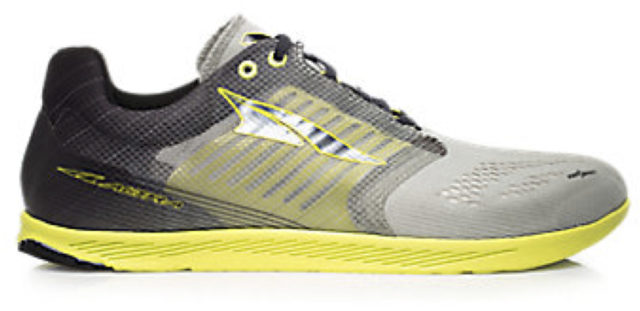
The Vanish R is Altra’s first road / track racing flat. Like most racing flats, it’s crazy light and offers very little in the way of cushioning. This definitely is not an everyday shoe, but it does provide Altra’s standard zero-drop, foot-shape platform in a race-ready package. This shoe is ideal for short races on road or on tracks, or for use (on occasion) in your fastest workout.
Stack Height
- Heel: 14 mm
- Toe: 14 mm
Drop: 0 mm
Stated Weight
- Men's: 111 g
- Women's: 111 g
MSRP: $100.00
TRAIL SHOES
(Most Cushioned to Least Cushioned)
Most Cushion
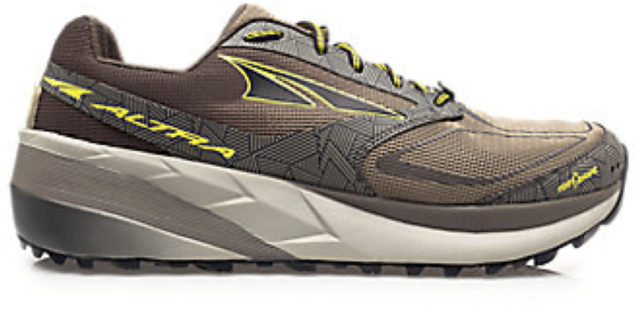
This is Altra’s response to the maximal trail-shoe market. The Olympus 3.5 is designed to provide maximum cushioning and protection on trail. The current Olympus 3.5 reportedly has a more durable upper compared to the Olympus 3.0, and has a slightly lower stack height and more flexible midsole compared to the old Olympus 2.0. The Olympus’ wide platform makes it fairly stable over technical terrain (given its high stack height), while the Vibram MegaGrip outsole provides great grip on a wide range of surfaces. This shoe is ideal for runners looking for protection and cushion and who are willing to deal with a little extra weight in exchange for added comfort. It’s also a great option for people who want a maximal shoe but find Hoka’s shoes to be too narrow.
Stack Height
- Heel: 33 mm
- Toe: 33 mm
Drop: 0 mm
Stated Weight
- Men's: 303 g
- Women's: 252 g
MSRP: $150.00
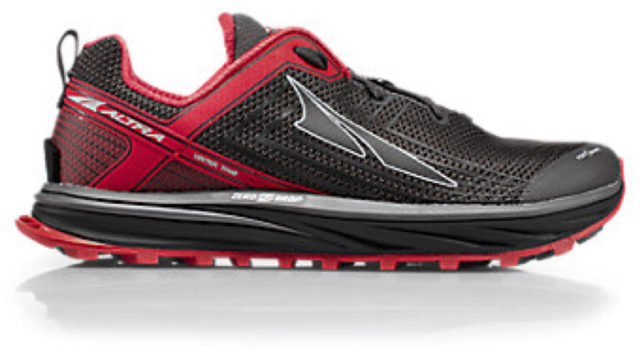
The Timp 1.5 offers a moderately high level of cushioning in a much lighter, and slightly less energetic package than the Olympus. The 1.5 features a new upper and updated fit. This shoe is designed for runners who want a combination of cushion, protection, and low weight. The Timp 1.5 shares the same midsole as the original Timp, so you can check out our review of that shoe for more, and stay tuned for our full review of the Timp 1.5.
Stack Height
- Heel: 29 mm
- Toe: 29 mm
Drop: 0 mm
Stated Weight
- Men's: 298 g
- Women's: 247 g
MSRP: $130.00
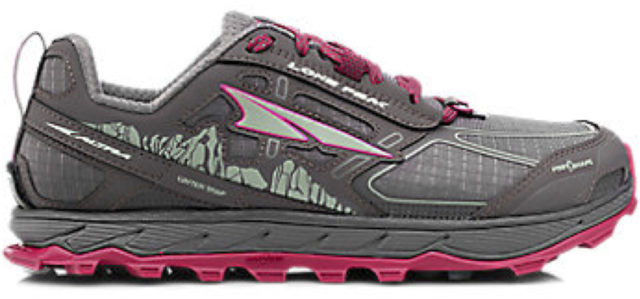
Stack Height
- Heel: 25 mm
- Toe: 25 mm
Drop: 0 mm
Stated Weight
- Men's: 289 g
- Women's: 241 g
MSRP: $120.00
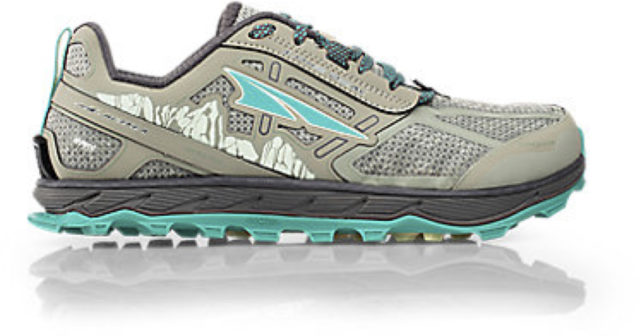
This is basically the Lone Peak 4 with a waterproof / breathable eVent upper and burlier outsole. If you’re a die-hard Lone Peak fan but find yourself running in mud and snow a lot, the RSM is for you. The waterproof upper does decrease breathability, so if you consistently run in hot weather, the standard Lone Peak 4 makes more sense. (Altra also makes a mid-height version for even more coverage.)
Stack Height
- Heel: 25 mm
- Toe: 25 mm
Drop: 0 mm
Stated Weight
- Men's: 309 g
- Women's: 255 g
MSRP: $150.00
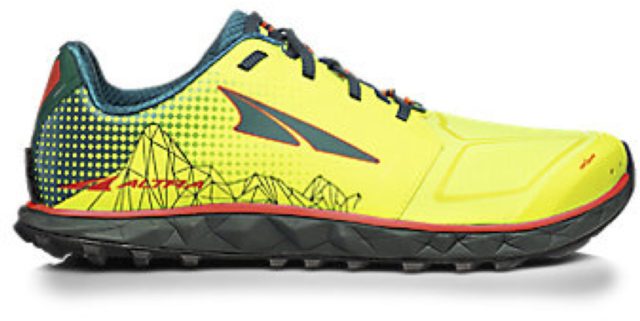
Stack Height
- Heel: 21 mm
- Toe: 21 mm
Drop: 0 mm
Stated Weight
- Men's: 224 g
- Women's: 187 g
MSRP: $110.00
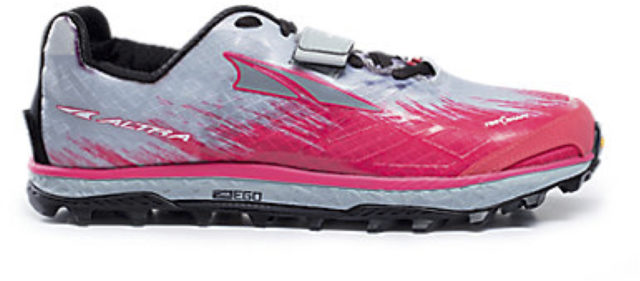
The King MT is designed for mud, whether it’s in an obstacle-course race or just a particularly wet trail run. It’s got big lugs, good drainage, and a close-fitting upper. If you’re looking for a mud shoe with a more accommodating fit than most other brands (e.g., Salomon or Inov-8), check out the King MT.
Stack Height
- Heel: 19 mm
- Toe: 19 mm
Drop: 0 mm
Stated Weight
- Men's: 241 g
- Women's: 198 g
MSRP: $140.00
Least Cushion
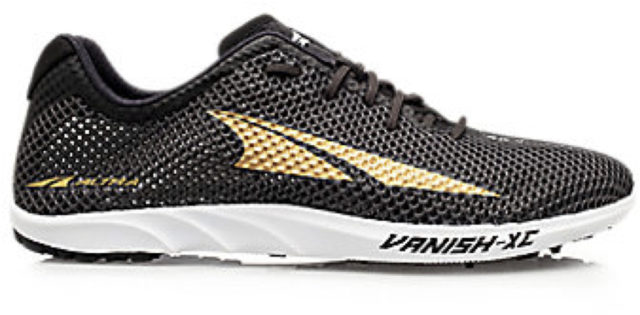
This Cross-Country racing flat brings Altra’s “foot shape” toe box and zero-drop platform to the XC racecourse. It has a unique lacing system that allows wearers to customize the lacing pattern to fit their foot. If you love the features of Altra shoes and want a shoe for short, fast, off-road races, the Vanish XC is worth a look.
Stack Height
- Heel: 15 mm
- Toe: 15 mm
Drop: 0 mm
Stated Weight
- Men's: 155 g
- Women's: 155 g

Love the fit on Altras, love the cushioning on Hokas. So depending on the current issue with my status, i pick one or the other.
I just listened to the podcast, and while the reviews could be useful in some ways, I do not feel like it is comprehensive or deep enough to make much of a splash. I was hoping to hear that you had someone helping with the reviews that actually fits people for shoes. You hit on it a bit, but I don’t think the people writing the reviews understand how important two factors are for people being comfortable in their shoes for activity. #1 what is the shape and volume of their feet #2 do they need pronation control. I would encourage you to collaborate with someone who sees these shoes on feet often to get more useful data.
Hi, Kimberly – thanks for the feedback. Just wanted to try to clarify a bit what we are — and what we are not — trying to accomplish here with these Guides.
Certainly, the goal of these Brand Guides is not Depth, it is Breadth. Our reviews of individual shoes is where we go deep and get very detailed.
The goal of these Brand Guides is to let people (a) quickly and easily get clearer on a massive number of shoes on the market, and (b) better understand where various shoes fit in a single brand’s own lineup. That’s a pretty specific aim, and we believe that it’s a useful one to help people home in on several shoes that might work well for them. Breadth.
So what you’re proposing makes total sense, it’s just a very different beast, I think.
And finally, “pronation control” is, of course, a very complicated topic, and I personally don’t believe that any person or shop should be telling runners that they “need pronation control.” (Or, as I am sure you’d agree, that would only be the conclusion of a *long* conversation, not the starting point of one.)
So we have no interest in directing people in that way, and doing so would definitely be far, far beyond the scope and intention of these Brand Guides. But we will definitely see how we can continue to evolve these Guides to make them better accomplish their intended purpose.
Just a quick note that this sort of plain-language guide is extremely helpful, as it’s surprisingly hard to otherwise understand a shoe company’s model line. As someone who knows which brands generally fit my feet and roughly what I’m looking for, I get a lot of value out of these guides. So, thanks!
Thank you, Goran! We’re very happy to hear this.
I will also say… this is _exactly_ what I was looking for to help me figure out what these shoes are for.
Very glad to hear this, Evan!